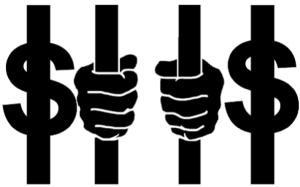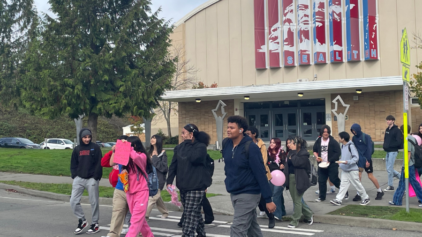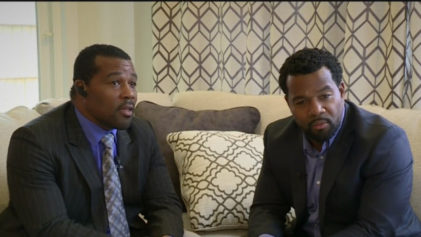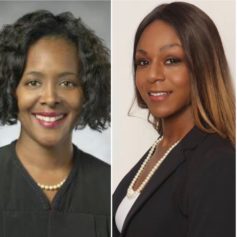As Black bodies are assaulted, disrespected and taken out in the streets, so too are they used, abused and manipulated for profit behind prison walls. Black lives matter wherever they are, including the prisons, where the new slavery operates, and corporations, schools and other institutions profit from Black men, and Black people in general.
This week, the Black Student Unions of the nine undergraduate University of California campuses passed a resolution demanding university divestment from private prisons, as the Contra Costa Times reported. The resolution also calls for a ban on such investments in the future.
“If we truly believe that #BlackLivesMatter from the hood to the academy, we must stand with our brothers, sisters, uncles, aunts, cousins and extended family members who are currently incarcerated or are at a higher risk of incarceration because of their very Blackness,” said a statement from the Afrikan Black Coalition.
According to a university spokesperson, UC invests $23 million in private prisons. The students also have called on the university to divest from Wells Fargo as long as it profits from private prisons, and reinvest the funds in education or businesses owned or operated by the formerly incarcerated.
The actions from the Black students come as a report was released documenting a chronic pattern of abuse at a Northern California prison. The report, issued by the Office of the Inspector General of California, High Desert State Prison in Susanville, California, was a scathing rebuke of the practices of the institution regarding excessive force against inmates, protection of inmates from assault and harm, and the treatment of prisoners with disabilities.
“There is evidence that a perception of insularity and indifference to inmates exists at High Desert State Prison, exacerbated by the unique geographical isolation, the high stress environment, and a labor organization that opposes oversight to the point of actively discouraging members from coming forward with information that could in any way adversely affect another officer,” the report said.
The report discusses a “culture of indifference” among guards, with no regard for the safety of vulnerable prisoners. Disabled prisoners are abused in the facility, and the sensitive needs yard is violent, “with gang politics meting out abuse and punishment for drug and gambling debts and extorting vulnerable inmates for protection, all of which is exacerbated by the tacit acquiescence of custody staff.” Further, the prison fosters a “culture of racism”:
.. officers called inmates the N-word or wetbacks. Black inmates wouldn’t get enough time to eat; the officers would ‘kick’ the blacks out of the chow hall first and then the Hispanics. The white inmates didn’t have to leave, they were running the kitchen.
.. officers were more racist than he experienced at his former prison and the white inmates were usually allowed to go to canteen first, and when it was the black inmates’ turn, the yard would sometimes be recalled [not allowing time for canteen purchases].
.. the white staff were very racist and bigoted, not just towards inmates but also towards officers that were of different a race. Staff would search the blacks more than others after chow. It wasn’t the search so much; it was the way they did it. He got that KKK and green wall feeling from HDSP.
The report also notes “the irony is that this very culture endangers the staff working at HDSP as much as anything else.” For example, a corrections officer committed suicide after he broke the so called “green wall of silence,” a code of silence which has “turned California’s state prisons into insular and isolated facilities of unconstitutional conditions, where what happens on the Inside stays on the Inside.” The Inspector General report calls for cameras in all inmate locations, as well as the use of body cameras. It is expected the state Senate will investigate and hold hearings into the matter.
As David Dahmer wrote in Madison365, the hyper-incarceration of Black men in this nation is “the most pressing civil rights issue of our time.” Young Black men are disproportionately locked up in the prime of their lives, incarcerated at a rate six times higher than that of whites. Dahmer shockingly reveals that the total number of imprisoned African-American men is larger than the total prison populations of India, Argentina, Canada, Lebanon, Japan, Germany, Finland, Israel and England—combined.
There are two factors standing in the way of ending the epidemic of mass incarceration, according to Dahmer. The first, is the existence of prisons as a profitable enterprise. With the prison population quadrupling to 500,000 since 1980, the number of private prisons has increased 1600 percent. With the private contracting of prisoners, there is an incentive to lock more and more people behind bars, as corporations and their stockholders lobby for longer sentences, more bodies behind bars, and more profits.
The second factor fueling the prison boom for Black men is the deterioration of American cities. In the urban centers, the blue-collar jobs that sustained the families of those who could not afford college have since disappeared, making way for poverty wage, fast food and retail jobs. And Black people typically are left to fend for themselves.
Meanwhile, Black lives are ruined wholesale in America, the so-called land of the free, in order to fatten the pockets of the wealthy. And we must ask how this country can continue to point its finger at other nations for their human rights violations and inhumane practices when America wrote the book on exploitation of Black people for profit.



